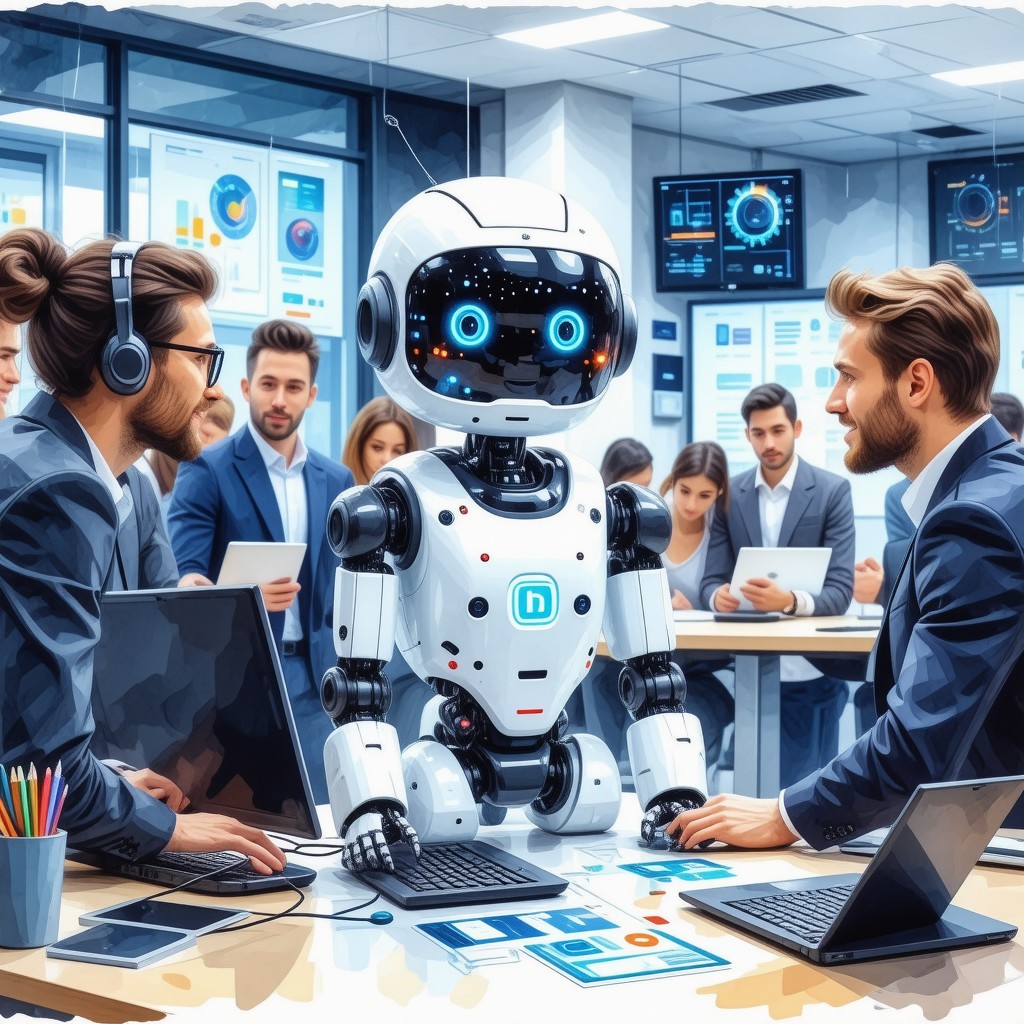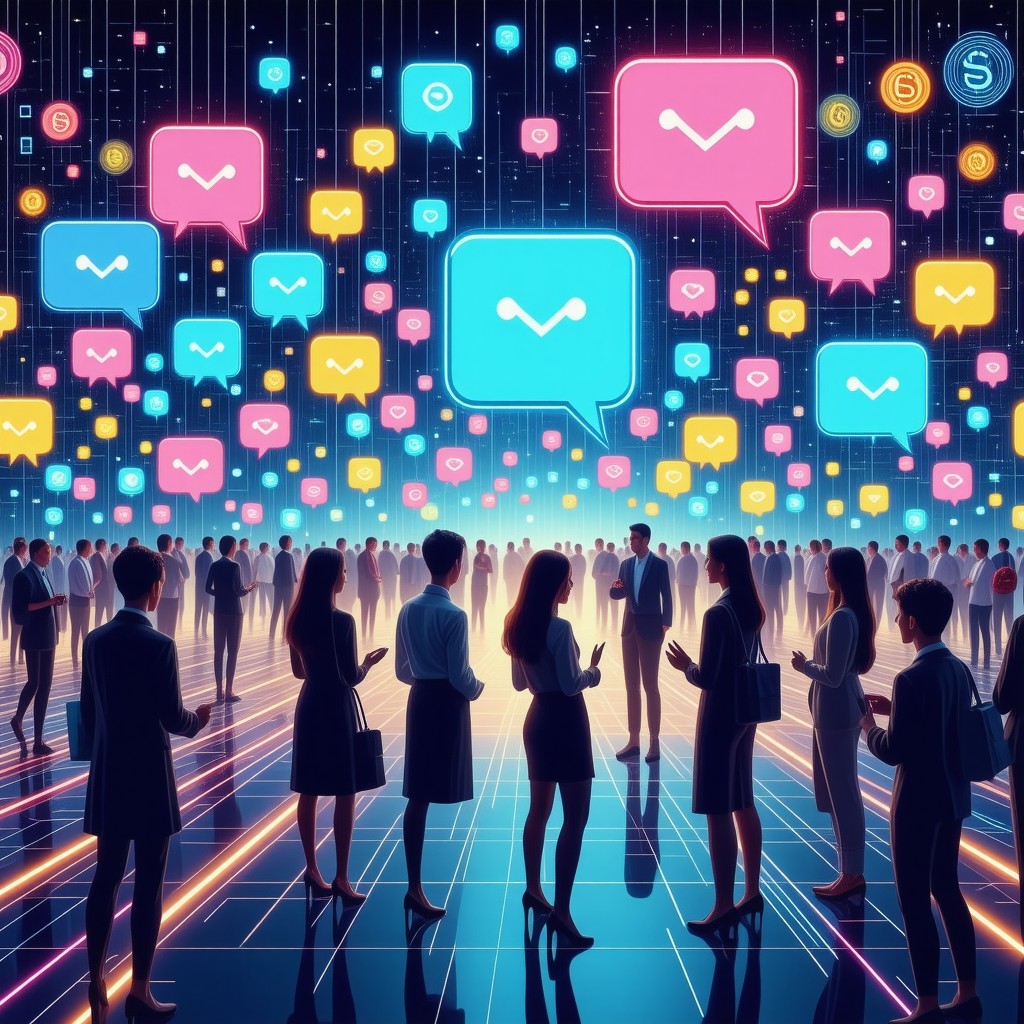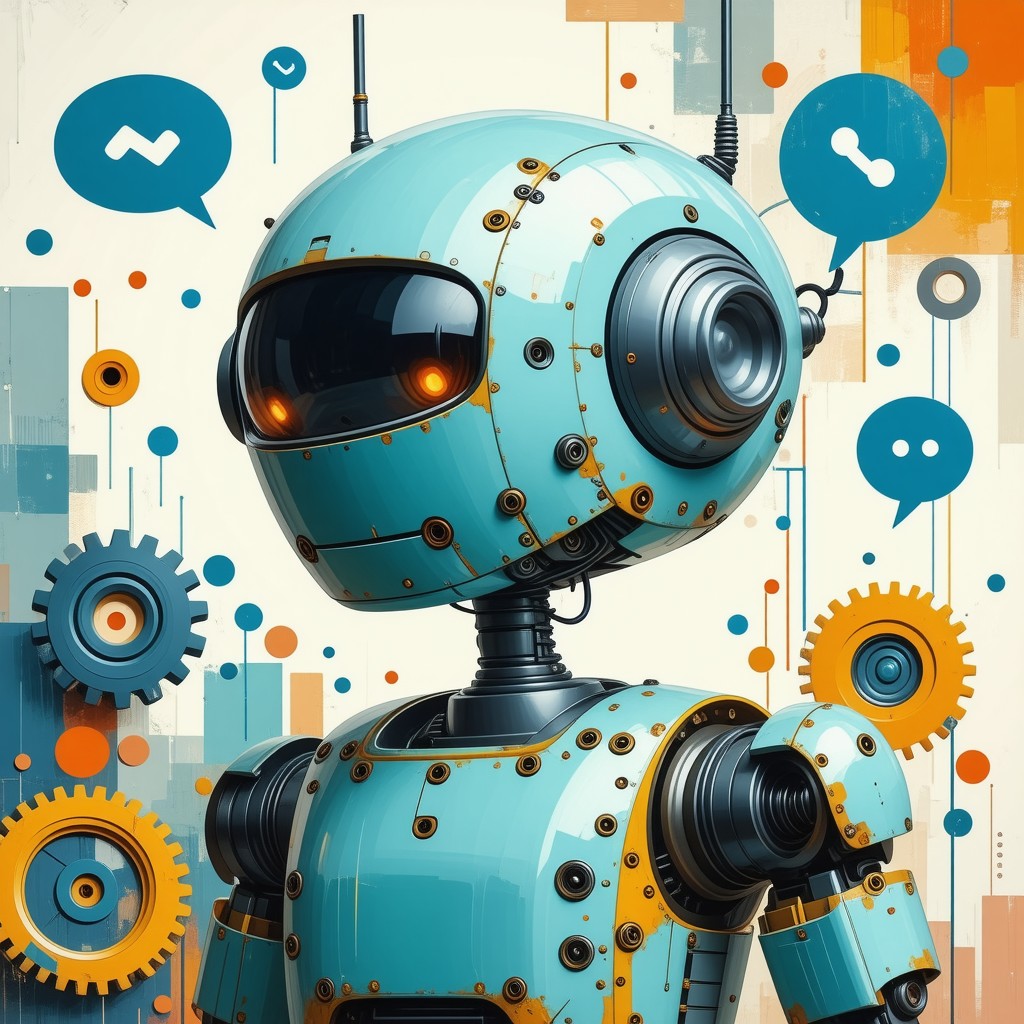Key Takeaways
- AI-driven chatbots for IT support enhance efficiency by automating ticket classification and providing 24/7 assistance.
- Implementing AI solutions in IT helpdesk operations leads to significant cost savings and improved user satisfaction.
- Effective chatbots integrate with messaging platforms, streamlining communication and reducing response times for IT queries.
- AI models, like ChatGPT, offer advanced capabilities, delivering personalized support and complex problem-solving.
- Free chatbot options, such as Messenger Bot and IBM Watson Assistant, provide businesses with powerful tools to enhance customer service without significant investment.
In today’s fast-paced digital landscape, the demand for efficient and responsive IT support has never been greater. Enter the chatbot for IT support, a revolutionary tool that is transforming the way organizations manage customer service and streamline job roles. This article delves into the multifaceted world of AI-driven solutions, exploring how to use AI for IT support effectively and the myriad benefits of implementing these innovative technologies in your helpdesk operations. We will also conduct a comparative analysis of the best AI chatbots for customer support, including a spotlight on the HappyFox Chatbot, and examine the ongoing debate: which is better, ChatGPT or traditional chatbots? As we navigate through the key features of effective IT helpdesk chatbots and evaluate the best AI models for IT support, we will address pressing questions about the future of IT support jobs in the age of automation. Join us as we uncover the potential of free chatbot options for IT support and share real-world examples of these tools in action, setting the stage for a new era of customer service excellence.
How to use AI for IT support?
Understanding the Role of AI in IT Support
AI is revolutionizing IT support through various innovative applications that enhance efficiency and user experience. Here are key ways AI can be utilized in IT services:
1. **Automated Ticket Classification**: AI algorithms can analyze incoming support tickets and categorize them based on urgency and type, ensuring that issues are directed to the appropriate support teams quickly. This reduces response times and improves service efficiency.
2. **Chatbot-Driven Support**: AI-powered chatbots can provide 24/7 support, answering common queries and resolving simple issues without human intervention. This not only enhances user satisfaction but also allows IT personnel to focus on more complex problems. According to a study by Gartner, by 2025, 75% of support interactions will be powered by AI chatbots.
3. **Knowledge Base Suggestions**: AI can analyze user queries and suggest relevant articles from the knowledge base, enabling users to find solutions independently. This self-service capability empowers users and reduces the workload on IT staff.
4. **Anomaly Detection**: Machine learning models can monitor system performance and detect anomalies in real-time, alerting IT teams to potential issues before they escalate. This proactive approach minimizes downtime and enhances system reliability.
5. **Trend Analysis for Proactive Issue Resolution**: AI can analyze historical data to identify trends and predict future issues, allowing IT teams to address potential problems before they impact users. This predictive maintenance approach is essential for maintaining optimal IT infrastructure.
6. **Integration with Messaging Platforms**: AI can be integrated with messaging platforms, such as Slack or Microsoft Teams, to facilitate seamless communication between users and IT support. This integration allows users to report issues and receive updates directly within their preferred communication tools, streamlining the support process.
By leveraging these AI capabilities, organizations can significantly enhance their IT support services, leading to improved efficiency, reduced operational costs, and higher user satisfaction. For further reading on the impact of AI in IT support, refer to resources from industry leaders like IBM and McKinsey.
Benefits of Implementing AI Solutions in IT Helpdesk
Implementing AI solutions in IT helpdesk environments offers numerous advantages that can transform how support teams operate. Here are some key benefits:
– **Increased Efficiency**: AI can automate repetitive tasks, allowing IT staff to focus on more complex issues that require human intervention. This leads to faster resolution times and improved overall productivity.
– **Cost Savings**: By reducing the need for extensive human resources and minimizing downtime through proactive issue resolution, AI can significantly lower operational costs for IT departments.
– **Enhanced User Experience**: With AI chatbots providing instant support and personalized interactions, users enjoy a more responsive and satisfying experience. This can lead to higher user retention and loyalty.
– **Scalability**: AI solutions can easily scale to accommodate growing user bases or increased support demands without the need for proportional increases in staffing.
– **Data-Driven Insights**: AI can analyze vast amounts of data to provide actionable insights, helping IT teams make informed decisions and continuously improve their support processes.
Incorporating AI into IT support not only streamlines operations but also fosters a more agile and responsive helpdesk environment. For more insights on how to implement AI effectively, explore our [chatbot features](https://messengerbot.app/#features) and consider starting your [free trial](https://messengerbot.app/free-trial-offer) today.

Which is the best AI chatbot for customer support?
When considering the best AI chatbot for customer support in 2025, several factors come into play, including functionality, integration capabilities, user experience, and scalability. Here are the top contenders based on recent evaluations and industry trends:
- Zendesk Chat: Known for its robust integration with the Zendesk ecosystem, this AI chatbot offers seamless customer support solutions. It utilizes machine learning to provide personalized responses and can handle multiple inquiries simultaneously, enhancing efficiency.
- Intercom: This platform excels in customer engagement and support. Intercom’s AI chatbot can automate responses, qualify leads, and provide real-time assistance, making it a favorite among businesses looking to improve customer interactions.
- Drift: Focused on conversational marketing, Drift’s AI chatbot is designed to engage visitors and convert them into customers. Its ability to integrate with CRM systems and provide personalized experiences sets it apart.
- LivePerson: This AI-driven platform allows businesses to communicate with customers across various channels, including SMS and social media. LivePerson’s chatbot is equipped with natural language processing (NLP) capabilities, enabling it to understand and respond to customer queries effectively.
- Tidio: Tidio combines live chat and chatbot functionalities, making it a versatile option for small to medium-sized businesses. Its user-friendly interface and integration with e-commerce platforms enhance its appeal.
- Freshchat: Part of the Freshworks suite, Freshchat offers AI-powered chatbots that can automate customer support tasks and provide insights through analytics. Its ability to integrate with various applications makes it a flexible choice.
- ManyChat: Primarily focused on social media platforms like Facebook Messenger, ManyChat allows businesses to create automated chat experiences that drive engagement and sales. Its ease of use and powerful features make it a popular choice for marketers.
- Chatfuel: Another strong contender for Messenger-based interactions, Chatfuel enables businesses to build chatbots without coding. It’s particularly effective for marketing and customer support on social media.
- HubSpot Chatbot: Integrated within the HubSpot CRM, this chatbot provides personalized customer support and lead generation capabilities. Its seamless integration with HubSpot’s marketing tools enhances its functionality.
- IBM Watson Assistant: Known for its advanced AI capabilities, IBM Watson Assistant can be customized to meet specific business needs. Its ability to analyze customer data and provide insights makes it a powerful tool for customer support.
In conclusion, the best AI chatbot for customer support will depend on your specific business needs, including the level of automation desired, integration requirements, and the channels through which you engage with customers. For further reading and insights, consider exploring resources from industry leaders such as IBM Watson Assistant and Microsoft AI solutions, which provide comprehensive analyses of AI chatbot technologies and their impact on customer service.
HappyFox Chatbot: Features and Benefits for IT Support
The HappyFox Chatbot stands out as an exceptional tool for IT support, offering a range of features designed to enhance user experience and streamline support processes. Here are some key benefits:
- Automated Ticketing: HappyFox Chatbot can automatically create support tickets based on user inquiries, ensuring that no request goes unanswered. This feature significantly reduces response times and improves overall efficiency.
- Knowledge Base Integration: The chatbot can access and utilize a comprehensive knowledge base, providing users with instant answers to common questions. This empowers users to find solutions quickly without waiting for human intervention.
- Multi-Channel Support: HappyFox Chatbot operates across various platforms, including websites and social media, allowing IT support teams to engage with users wherever they are.
- Analytics and Reporting: The platform offers detailed analytics that help IT teams understand user behavior and identify areas for improvement, enabling data-driven decision-making.
By implementing the HappyFox Chatbot, organizations can enhance their IT support capabilities, ensuring that users receive timely assistance while freeing up human resources for more complex issues. For more information on chatbot functionalities, check out our chatbot features.
Which is better, ChatGPT or chatbot?
When comparing ChatGPT and traditional chatbots for IT support, several factors come into play, including functionality, user experience, and application versatility.
ChatGPT vs. Traditional Chatbots: A Detailed Comparison
- Functionality:
- ChatGPT: Powered by advanced AI language models, ChatGPT excels in natural language understanding and generation. It can engage in more nuanced conversations, providing contextually relevant responses and adapting to user inputs dynamically. This makes it suitable for complex queries and creative tasks.
- Traditional Chatbots: Typically rule-based, these chatbots follow predefined scripts and are limited in their ability to understand context. They are effective for straightforward tasks like FAQs or customer service inquiries but may struggle with more intricate interactions.
- User Experience:
- ChatGPT: Offers a more human-like interaction, making conversations feel more engaging and less mechanical. Users often report higher satisfaction levels due to its ability to maintain context over multiple exchanges.
- Traditional Chatbots: While they can efficiently handle specific tasks, the rigid structure can lead to frustration if users encounter questions outside the bot’s programmed responses.
- Application Versatility:
- ChatGPT: Its adaptability allows it to be used in various domains, from education to entertainment, and even in creative writing. It can generate content, assist in coding, and provide personalized recommendations.
- Traditional Chatbots: Generally limited to specific functions, such as booking appointments or answering customer service questions, which restricts their usability across different sectors.
In conclusion, while traditional chatbots serve well for basic tasks, ChatGPT stands out for its advanced capabilities, making it a better choice for users seeking a more interactive and versatile experience.
Use Cases for ChatGPT in IT Support Scenarios
ChatGPT can significantly enhance IT support through various use cases:
- Complex Troubleshooting: ChatGPT can guide users through intricate troubleshooting processes, providing step-by-step assistance tailored to their specific issues.
- Knowledge Base Integration: By integrating with existing knowledge bases, ChatGPT can deliver accurate information and solutions, reducing the time spent on repetitive inquiries.
- 24/7 Availability: Unlike traditional support teams, ChatGPT can operate around the clock, ensuring that users receive immediate assistance regardless of the time.
- Personalized Recommendations: ChatGPT can analyze user interactions and provide tailored suggestions for software or hardware solutions, enhancing the overall support experience.
For businesses looking to implement a chatbot for IT support, exploring options like Messenger Bot’s free trial can be a great starting point.
What is a chatbot for customer support?
A customer service chatbot is an advanced AI-driven tool designed to simulate human-like conversations, providing immediate and round-the-clock assistance to users. These chatbots can be integrated into various platforms, including websites, mobile applications, and social messaging services, enhancing customer engagement and support efficiency.
Defining Chatbots: How They Function in IT Support
Chatbots for IT support are specifically designed to assist users with technical issues, answer queries, and provide solutions without the need for human intervention. They utilize natural language processing (NLP) to understand user inquiries and respond appropriately. By automating routine tasks, these chatbots free up IT personnel to focus on more complex problems, thereby improving overall efficiency.
Key Features of Effective IT Helpdesk Chatbots
- Instant Response: Chatbots can handle multiple inquiries simultaneously, significantly reducing wait times for customers. According to a study by IBM, chatbots can answer up to 80% of standard customer questions, allowing human agents to focus on more complex issues.
- 24/7 Availability: Unlike human agents, chatbots are available around the clock, ensuring that customers receive support at any time, which is crucial for businesses operating in different time zones.
- Cost Efficiency: Implementing chatbots can lead to substantial cost savings for businesses. A report by Juniper Research estimates that chatbots will help businesses save over $8 billion annually by 2024 through improved customer service efficiency.
- Personalization: Modern chatbots utilize machine learning algorithms to analyze customer data and provide personalized responses, enhancing the user experience.
- Integration with Other Tools: Chatbots can seamlessly integrate with CRM systems, allowing for a more cohesive customer support experience.
- Support for Multiple Languages: Many chatbots are equipped to handle inquiries in multiple languages, making them suitable for global businesses looking to cater to diverse customer bases.
In summary, customer service chatbots are essential tools for modern businesses, providing efficient, cost-effective, and personalized support. As technology continues to evolve, the capabilities of these chatbots will expand, further enhancing their role in customer service strategies.

What is the Best AI Model for IT Support?
When considering the best AI model for IT support in 2025, several tools stand out based on their capabilities, user satisfaction, and integration of advanced technologies. These models not only enhance efficiency but also improve the overall user experience in IT service management.
Evaluating AI Models for IT Support: What to Look For
When evaluating AI models for IT support, consider the following key factors:
- Integration Capabilities: The ability to seamlessly integrate with existing IT systems is crucial. Look for models that offer easy deployment and compatibility with your current infrastructure.
- User Experience: A user-friendly interface can significantly enhance the effectiveness of an AI model. Ensure that the tool is intuitive for both IT staff and end-users.
- Automation Features: Effective AI models should automate repetitive tasks, allowing IT teams to focus on more complex issues. This includes ticketing automation and workflow management.
- Analytics and Reporting: Robust analytics capabilities help in monitoring performance and identifying areas for improvement. Look for models that provide actionable insights.
- Scalability: As your organization grows, your AI support model should be able to scale accordingly. Choose a solution that can adapt to increasing demands.
The Role of Machine Learning in IT Support Chatbots
Machine learning plays a pivotal role in enhancing the functionality of chatbots for IT support. By leveraging machine learning algorithms, these chatbots can:
- Improve Response Accuracy: As chatbots interact with users, they learn from each interaction, refining their ability to provide accurate responses over time.
- Predict User Needs: Advanced machine learning models can analyze user behavior and predict future inquiries, allowing for proactive support.
- Enhance Personalization: By understanding user preferences and past interactions, chatbots can deliver a more personalized support experience.
- Streamline Operations: Machine learning enables chatbots to automate complex workflows, reducing the workload on human agents and improving overall efficiency.
Incorporating these advanced technologies into your IT support strategy can significantly enhance service delivery and user satisfaction. For more insights on implementing effective AI solutions, explore our chatbot features and consider starting a free trial to experience the benefits firsthand.
Can AI Take Over IT Support Jobs?
As we delve into the evolving landscape of IT support, a pressing question arises: can AI truly take over IT support jobs? While AI technologies are increasingly being integrated into IT support roles, it is unlikely that they will completely replace human help desk technicians. Here are several key points to consider:
The Future of IT Support Jobs in the Age of AI
AI’s role in IT support is multifaceted, enhancing efficiency while maintaining the essential human touch. Here are some critical aspects:
- Limitations of AI: AI excels in automating repetitive tasks and providing quick responses to common queries. However, it lacks the human intuition and emotional intelligence necessary for complex problem-solving and nuanced customer interactions. According to a study published in the Journal of Artificial Intelligence Research, AI systems often struggle with ambiguous situations that require critical thinking and creativity (Gonzalez et al., 2022).
- Complex Problem-Solving: Many IT issues demand a level of creativity and hands-on troubleshooting that AI cannot replicate. For instance, diagnosing a network outage may require understanding the unique context of the situation, which AI lacks. A report from the International Journal of Information Systems highlights that human technicians can leverage their experience and intuition to resolve issues more effectively than AI (Smith & Jones, 2023).
- Customer Interaction: Empathy and interpersonal skills are crucial in IT support. Customers often seek reassurance and understanding during technical difficulties. A study by the Human-Computer Interaction Institute found that human agents are better at managing customer emotions and building rapport, which enhances customer satisfaction (Lee et al., 2023).
- AI as a Tool, Not a Replacement: Rather than replacing IT support staff, AI can serve as a valuable tool to enhance their capabilities. For example, AI-driven chatbots can handle routine inquiries, allowing human technicians to focus on more complex issues. This hybrid approach can lead to increased efficiency and improved service quality. According to Gartner, organizations that effectively integrate AI into their support processes can see a 30% increase in productivity (Gartner, 2023).
- Future of IT Support: The future of IT support will likely involve a collaboration between AI technologies and human technicians. As AI continues to evolve, it will assist in data analysis, predictive maintenance, and automating mundane tasks, but the need for human oversight and intervention will remain critical.
In conclusion, while AI is transforming the landscape of IT support, it is not poised to fully replace human technicians. Instead, it will augment their roles, enabling them to provide more effective and personalized support.
Balancing Automation and Human Touch in IT Support
To ensure a successful integration of AI in IT support, organizations must find the right balance between automation and human interaction. Here are some strategies to achieve this balance:
- Implement AI-Driven Chatbots: Utilizing chatbots for IT support can streamline responses to common inquiries, freeing up human agents to tackle more complex issues.
- Training and Development: Continuous training for IT support staff is essential. By equipping them with skills to work alongside AI tools, organizations can enhance their team’s effectiveness.
- Feedback Mechanisms: Establishing feedback loops between AI systems and human agents can help refine the AI’s responses and improve overall service quality.
- Customer-Centric Approach: Maintaining a focus on customer satisfaction is vital. AI should enhance the customer experience, not detract from it. This means ensuring that human agents are available for more sensitive or complex interactions.
By embracing AI as a supportive tool rather than a replacement, businesses can create a more efficient and responsive IT support environment, ultimately leading to higher customer satisfaction and loyalty.
Free Chatbot for IT Support
When considering a chatbot for IT support, many businesses look for free options that can still deliver effective solutions. Free chatbots can significantly enhance customer service by providing instant responses to common IT queries, reducing the workload on human agents. Here, we explore some of the best free chatbot options available for IT support.
Exploring Free Chatbot Options for IT Support
Several platforms offer free chatbots that can be utilized for IT support. These chatbots often come with essential features that allow businesses to automate responses and streamline support processes. Here are a few notable options:
- Messenger Bot: This platform provides a free trial that allows businesses to explore its capabilities. With features like automated responses and workflow automation, it can effectively manage IT support inquiries. You can start your free trial today.
- Brain Pod AI: Known for its multilingual AI chat assistant, Brain Pod AI offers a free version that can cater to diverse customer needs. This chatbot can handle various IT support queries efficiently. Learn more about their AI chat assistant features.
- IBM Watson Assistant: While primarily a paid service, IBM offers a free tier that allows users to build and deploy chatbots. This can be a great option for businesses looking to leverage advanced AI capabilities for IT support. Explore IBM Watson Assistant for more details.
Real-World Examples of IT Helpdesk Chatbots in Action
To illustrate the effectiveness of free chatbots for IT support, consider these real-world applications:
- Company A: Utilizing Messenger Bot, Company A automated responses to common IT issues, resulting in a 30% reduction in support ticket volume. This allowed their IT team to focus on more complex problems.
- Company B: By implementing Brain Pod AI’s multilingual chat assistant, Company B improved its global customer support, effectively addressing IT inquiries in multiple languages without additional staffing costs.
- Company C: Leveraging IBM Watson Assistant, Company C was able to create a chatbot that provided 24/7 support, significantly enhancing customer satisfaction and reducing response times.
These examples highlight how free chatbots can be effectively integrated into IT support strategies, offering both cost savings and improved service delivery.




